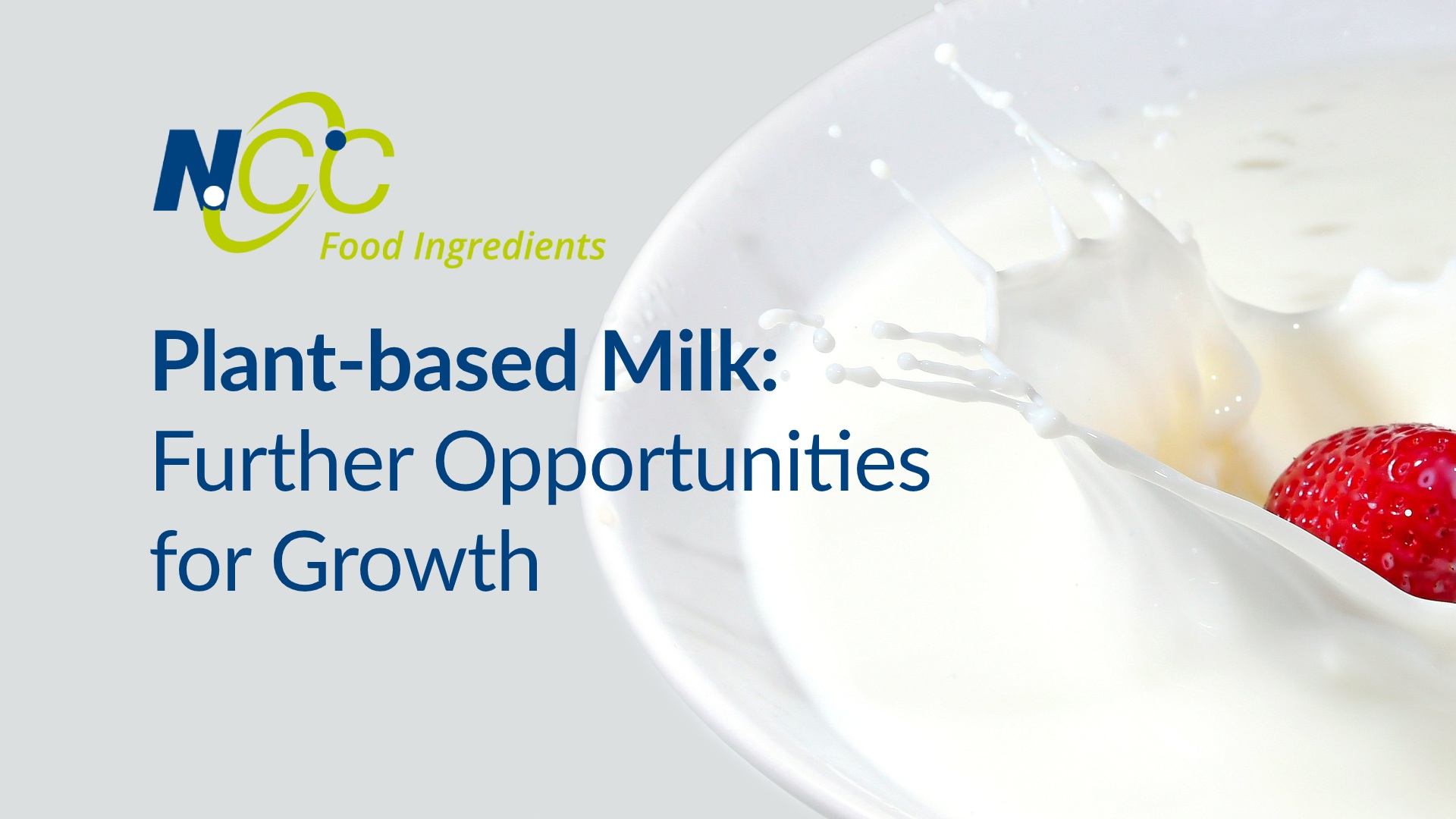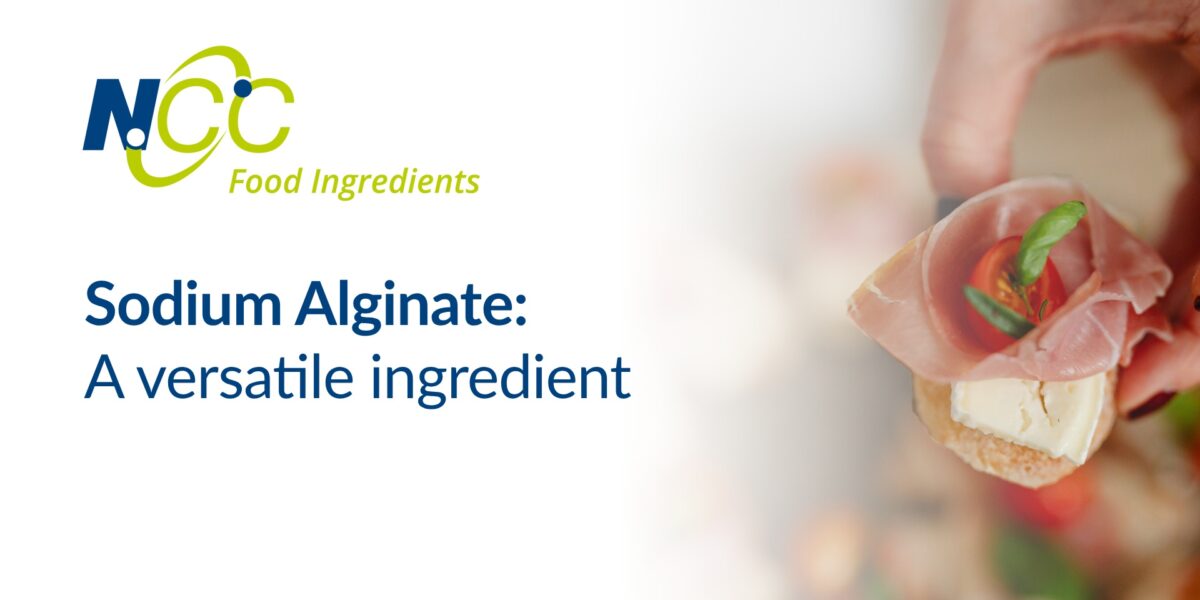Lisa Kelly, Sales Executive, Food Ingredients, takes a closer look at plant-based milk.
Alternatives to milk have existed in the market for a considerable amount of time, however like other vegan products such as meat alternatives they have only become more mainstream recently. There has been strong growth in the US and EU markets for non-dairy milk, in fact according to Mintel, milk alternatives in the US have grown by 61% since 2012. The Vegan Society, predicts that in the UK between 2020 – 2025 that an estimated compound annual growth rate of 13.8% will be achieved by non-dairy milk. Research carried out by Mintel estimated that in 2019 nearly one quarter of people (23%) in the UK were now drinking non-dairy milk, this was up from 19% in 2018.
Not all milk alternatives are equal
Though at present most growth in the market is being driven by the younger generation; nearly a third of all 16-24-year olds (33% in the UK), means there is a scope to increase these figures across the board. Most of the growth in the market has been dictated by innovation in the industry. Traditionally soya milk was the main option for people who are lactose intolerant or those who prefer a dairy free diet. Though there are many brands of soya milk on the market they typically don’t vary much nutritionally, the soya bean contains high levels of protein 36g protein/100g and has a good source of fats, mainly polyunsaturated and monounsaturated, and carbohydrates. The taste, however, has been described as slightly chalky or bean like which can be not so appealing to some consumers. Fortunately, there are now many options which can provide a better taste profile, these include almond, coconut, hazelnut, hemp, flax, as well as oat milk.
At present, there is a somewhat crowded marketplace with many brands and types of plant-based milks in competition. According to Mintel’s Emma Clifford, Associate Director of UK Food and Drink, consumers are driven to plant-based milk alternatives because of “concerns around health, ethics and the environment”. Considering that a glass of dairy milk makes nearly three times more greenhouse gas emissions (2018 study, University of Oxford) than any plant-based milk, it is easy to understand consumers concerns.
Almond Milk – Environmental Impact
Though plant-based milks are more environmentally sound than dairy milk, it has come to light the impact that almond milk has. Over 80% of the world’s almonds are grown in California. As part of the process, bees are required to pollinate the trees, with the majority of almond growers renting colonies. According to Science Daily and Ohio State News, in 2014, approximately 80,000 colonies (5% of the bees used for pollinating) died. Following a study conducted by Reed Johnson a bee expert from Ohio State University. It was discovered that almond growers were combining fungicides and insecticides during the almond bloom period. The result of this was causing bees to increasingly die in large numbers. Though the recommendations from the report (2019) are now being implemented, almond growing also has another environmental challenge. It requires huge quantities of water to grow almonds, (one California almond has a water footprint average of 12 litres (3.2 gallons). Considering that California has in the last few years increasingly seen major shortages of water. This in turn means that there are some ethical questions associated with almond milk at present.
Unfortunately, there are currently challenges with some other milk alternatives as well. According to the Guardian article ‘Almonds are out. Dairy is a disaster. So what milk should we drink?’, the only ethical option currently is milk made from oats.
The Rise of Oat Milk
Consumption of oat milk has risen dramatically, in 2018 there were even oat milk shortages reported in the US. As a result, the market leader in oat-based milk, Oatly has seen major expansion and investment. The Swedish company reportedly sold a 10% stake for $200 million this year to a group led by private equity firm, Blackstone Group Inc. Included in this group are very well known personalities such as Oprah Winfrey, Jay-Z, Natalie Portman, among others. Though the company has existed since 1994, it is only recently that it has seen major expansion. A UK competitor, PureOatly also has experienced big growth and recently opened a large new production plant in Cambridgeshire. The Oat milk alternative is at present the front runner of plant-based alternatives. However, with the creativity and innovation driving the industry this could all change if a new alternative is produced that is more alike to cow’s milk in taste.
Discrepancies between milks
Aside from the environmental and ethical concerns that some plant-based milks have such as almonds, there are a few hurdles that plant-based milks need to cross sooner rather than later. These include the discrepancy between products as regards to nutritional values and the differences in ingredients. In the table below is listed a few plant-based milks alongside dairy milks, with nutritional values and benefits.
| Per 100ml | Benefits | Ingredients | Calcium | Fat | Protein | Sugar | Calories |
| Tesco Almond Drink (Unsweetened) | Vegan/lactose free Fortified with Vitamin D, E, B12 Riboflavin (Vitamin B2) | Water, Almonds (2%), Tricalcium Phosphate, Sea Salt, Stabilisers (Carob Gum, Gellan Gum), Emulsifier (Sunflower Lecithins), Vitamin E, Vitamin B12, Riboflavin, Vitamin D. | 120mg | 1.2g | 0.7g | N/A | 14 kcal |
| Tesco Almond Drink (Sweetened) | Vegan/lactose free Fortified with Vitamin D, E, B12 Riboflavin (Vitamin B2) | Water, Sugar, Almonds (2%), Tricalcium Phosphate, Sea Salt, Stabilisers (Carob Gum, Gellan Gum), Emulsifier (Sunflower Lecithins), Vitamin E, Vitamin B12, Riboflavin, Vitamin D. | 120mg | 1.3g | 0.6g | 2.8 | 27 kcal |
| Alpro Oat Drink | Vegan/lactose free Rich in fibre Source of calcium & vit. B2, B12, D Naturally low in fat No added sugars | Oat Base (Water, Oat (9.8%)), Chicory Root Fibre, Sunflower Oil, Calcium (Tri-Calcium Phosphate), Sea Salt, Stabiliser (Gellan Gum), Vitamins (B2, B12, D2) | 120mg | 1.5g | 0.3g | 3.2g | 43kcals |
| Full fat cow’s milk | High in Protein, Calcium and Iodine Riboflavin (Vitamin B2) Vitamin B12 Potassium Iodine | Milk | 124mg | 3.7g | 3.5g | 4.7g | 66kcals |
| Skimmed milk | High in Protein, Calcium and Iodine Riboflavin (Vitamin B2) Vitamin B12 Potassium Iodine | Milk | 130mg | 0.1g | 3.6g | 5.0g | 35kcals |
As the table demonstrates, plant-based milk often is lower in fat and calories than full fat dairy milk, however not all plant-based milks are uniform. Presently there are no standardised guidelines that milk alternatives need to follow. Though many contain added calcium and vitamins some have lower amounts of protein than dairy milk, as well as added sugar or other ingredients. In addition, though the taste of some plant-based milk has gotten closer to the taste of dairy milk it could be argued that there is still room for improvement.
Not that these points are necessarily a barrier to all consumers, rather those that are making the move from cows’ milk to plant-based may need to navigate a few hurdles of trialling different products to find a suitable substitute. Food manufacturers that are able to further innovate and develop plant-based milk substitutes that taste closer to dairy milk could make significant in-roads in the market space. One thing is for sure, plant-based milk is here to stay and will only grow in popularity.
About NCC Food Ingredients
NCC Food Ingredients is a leading provider of functional and Innovative Ingredients with a focus on health and wellness. With a team of dedicated and qualified food personnel NCC Food Ingredients has a deep and informed understanding of the many challenges facing the food industry today.
Working in close partnership with highly innovative producers across the globe we provide our customers with a wide range of functional, clean label products and technologies. Our customer base ranges from international producers of foods and beverages to small niche artisan creators of fine foods. We support our customers from the very early stages of product development through to end production.
At NCC Food Ingredients we have assisted customers in the reformulation as well as the development of new products. Our experience and assistance have resulted in going above and beyond what our customers expected. Leading to strong sales and repeat orders. If you wish to know more, fill out the form below and we’ll be in touch.





